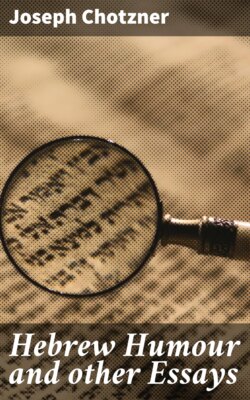Читать книгу Hebrew Humour and other Essays - Joseph Chotzner - Страница 8
На сайте Литреса книга снята с продажи.
Footnotes
ОглавлениеTable of Contents
[13-1] De Sacra Poesi Hebraeorum, Goettingae, 1758.
[14-1] The words here quoted were found on the fly-leaf of Sir William's Bible.
[15-1] Lecky, in his History of European Morals, vol. I, p. 366, refers to a modern writer, who maintains that Homer derived the noblest conception of his poetry from the Old Testament; and that its contents have greatly influenced Demosthenes and Plato.
[15-2] Annales, ii. 85.
[15-3] Pro Flacco, §§ 66–70.
[15-4] Satirae, iii. 10.
[15-5] Satirae, i. 4.
[16-1] This omission of common courtesy is recorded in the following jocular Latin lines:—
Si Lyra non lyrasset
Lutherus non saltasset.
“Had Lyra not furnished the music,
Luther could not have danced.”
[17-1] Almost all the English translations of the extracts from Greek and Latin poetical writings quoted in this essay are from the renderings of Pope and Dryden. Space will not allow to give here more than a few quotations from the originals.
[17-2]
Ὦ πάτερ, ἦ μέγα θαῦμα τόδ' ὀφθαλμοῖσιν ὁρῶμαι.
ἔμπης μοι τοῖχοι μεγάρων καλαί τε μεσόδμαι
εἰλάτιναί τε δοκοὶ καὶ κίονες ὑψόσ' ἔχοντες
φαίνοντ' ὀφθαλμοῖς ὡς εἰ πυρὸς αἰθομένοιο.
ἦ μάλα τις θεὸς ἔνδον, οἳ οὐρανὸν εὐρὺν ἔχουσιν.
[18-1]
Inde ubi prima quies medio iam noctis abactae
Curriculo expulerat somnum; cum femina primum
Cui tolerare colo vitam tenuique Minerva,
Impositum cinerem et sopitos suscitat ignes,
Noctem addens operi, famulasque ad lumina longo
Exercet penso.
[23-1]
Ac veluti magno in populo quum saepe coorta est
Seditio, saevitque animis ignobile vulgus;
Iamque faces et saxa volant; furor arma ministrat;
Tum, pietate gravem ac meritis si forte virum quem
Conspexere, silent arrectisque auribus adstant;
Ille regit dictis animos et pectora mulcet.
[23-2] An interesting article on the same theme written by Mr. C. G. Montefiore appeared in the Jewish Quarterly Review, vol. III, No. 12.
